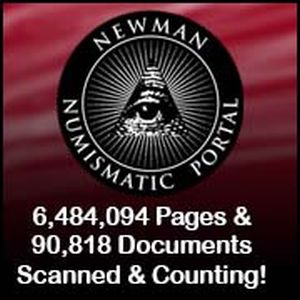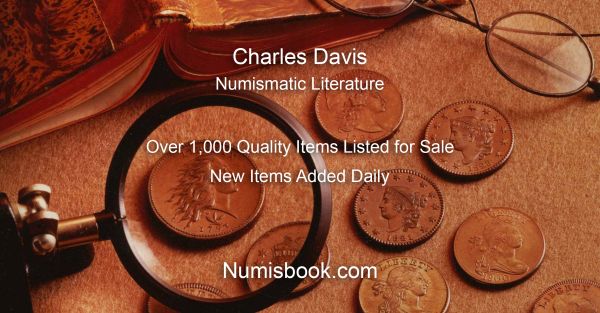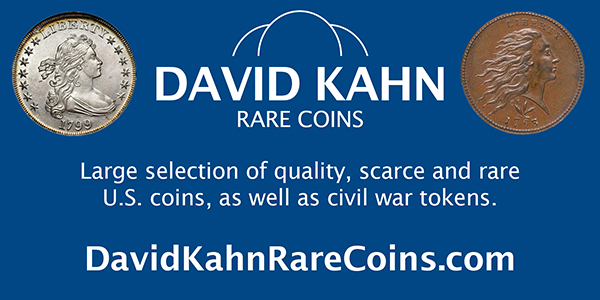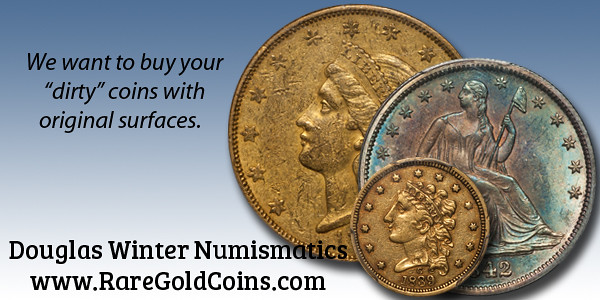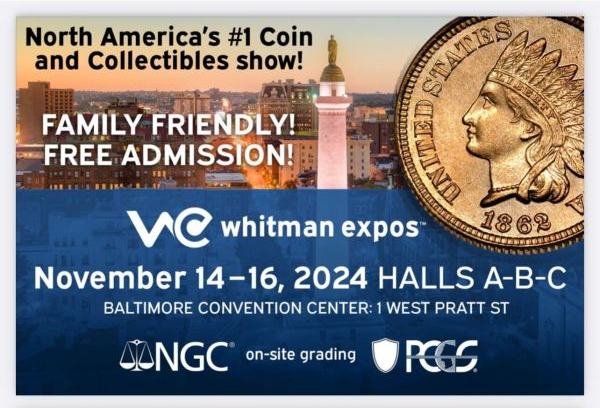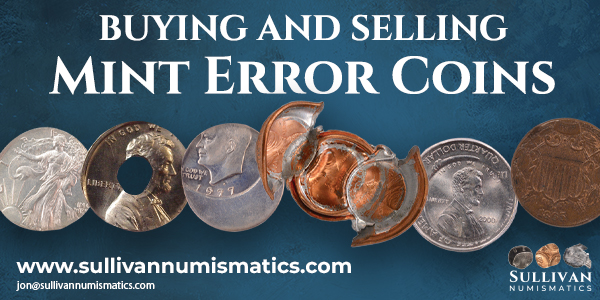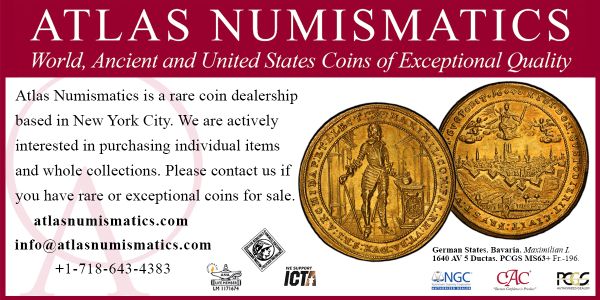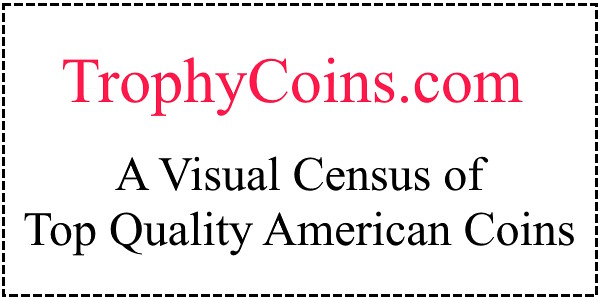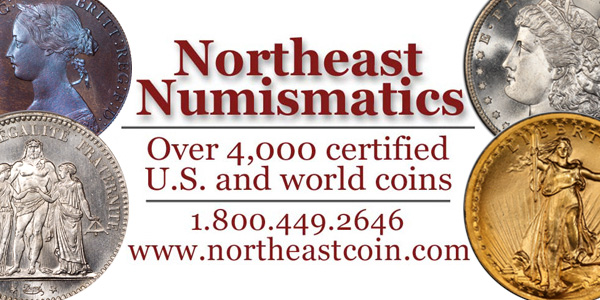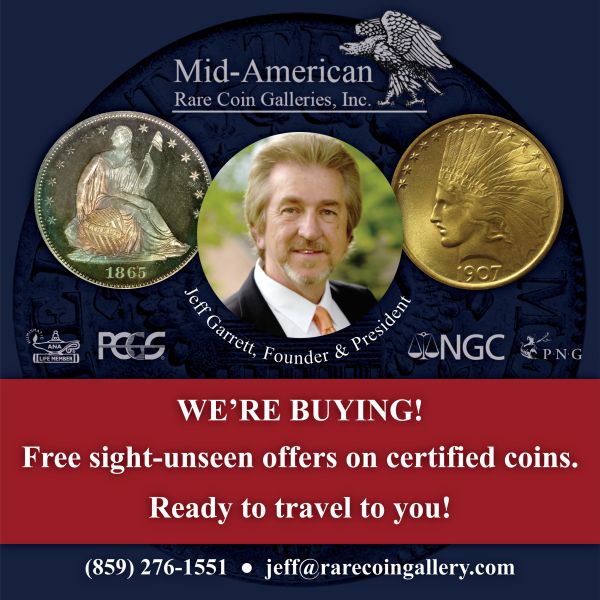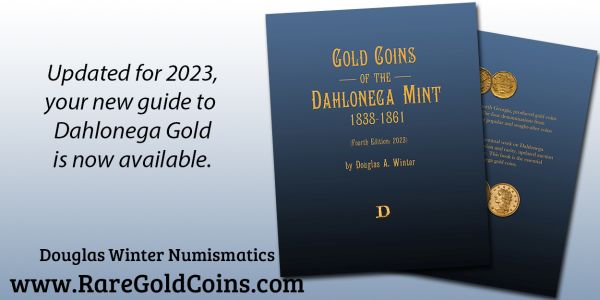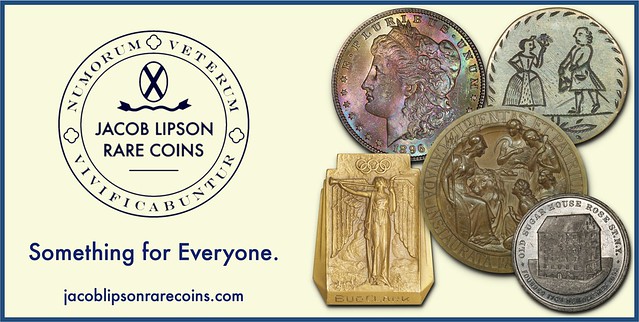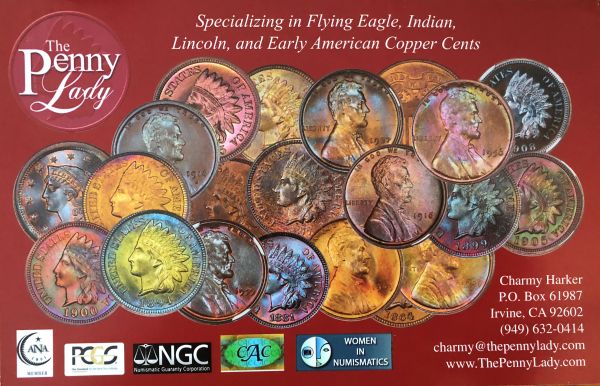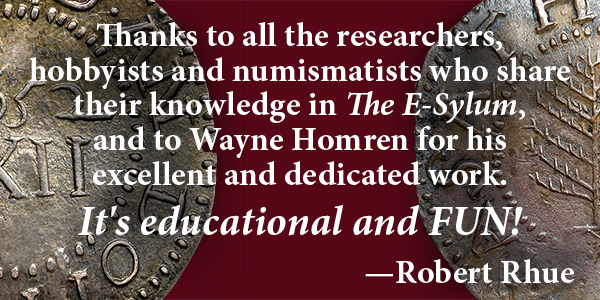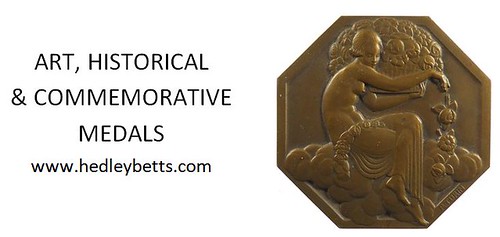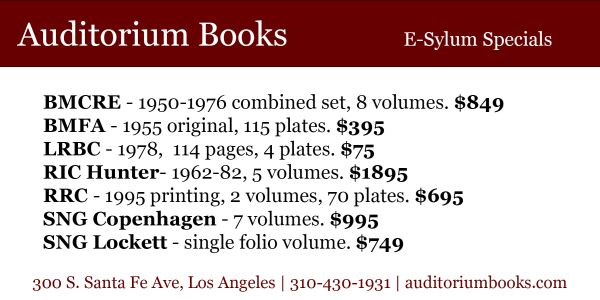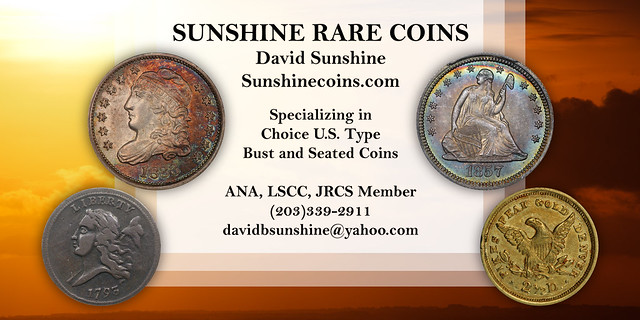
Visit our NBS Sponsors



About UsThe Numismatic Bibliomania Society is a non-profit association devoted to the study and enjoyment of numismatic literature. For more information please see our web site at coinbooks.org SubscriptionsThose wishing to become new E-Sylum subscribers (or wishing to Unsubscribe) can go to the following web page link MembershipThere is a membership application available on the web site Membership Application To join, print the application and return it with your check to the address printed on the application. Print/Digital membership is $40 to addresses in the U.S., and $60 elsewhere. A digital-only membership is available for $25. For those without web access, write to: Jeff Dickerson, Treasurer AsylumFor Asylum mailing address changes and other membership questions, contact Jeff at this email address: treasurer@coinbooks.org SubmissionsTo submit items for publication in The E-Sylum, write to the Editor at this address: whomren@gmail.com BUY THE BOOK BEFORE THE COINSale Calendar
|
- WAYNE'S WORDS: THE E-SYLUM NOVEMBER 10, 2024
- MORE KRAUSE LIBRARY BOOKS OFFERED
- NEW BOOK: PAPER DREAMS
- ADDENDUM: PHILIPPINE EMERGENCY CURRENCY 2ND ED
- JAMES RICHARD BARRY (1936-2024)
- GALLATIN, MISSOURI ELECTION DAY BATTLE OF 1838
- VIDEO: EVOLUTION OF A COLLECTOR
- PAWN STARS VIEWS 1933 DOUBLE EAGLE
- LEVANTINE COINS ONLINE
- THE EARLIEST KNOWN CURRENCIES
- NOTES FROM E-SYLUM READERS: NOVEMBER 10, 2024
- NEW YORK CATHOLIC DIOCESE CENTENNIAL MEDAL
- DR. HEINRICH TRAUN MEDALS
- VOCABULARY TERM: PROVENANCE
- COIN COLUMNIST BARBARA ANN LYON
- KELLEN HOARD INTERVIEW, PART FIVE
- KEN BRESSETT AND NENA NEWS
- BIOGRAPHICAL SKETCH OF BERNT AHLSTROM
- THE RIBBIT BACKSTORY
- SOVEREIGN RARITIES WORKMAN COLLECTION, PART 4
- SBG NOVEMBER 2024 CURRENCY SHOWCASE
- CARSON CITY MINT BULLION SCALES
- HOLABIRD NOVEMBER 2024 SELECTIONS
- MORTON & EDEN OFFER DICKIN MEDAL
- FRANK ROBINSON 126TH AUCTION
- HERITAGE SELLS SCHUMAN HARD TIMES TOKENS
- NEW ENGLAND TRIM
- GERMAN INFLATION SPIRALS OUT OF CONTROL
- UPDATE: NEPAL NOTE'S MAP RILES INDIA
- CHICAGO SALVATION ARMY GOLD COIN DONATIONS
- WHEN A WINNING BIDDER DOESN'T PAY
Content presented in The E-Sylum is not necessarily researched or independently fact-checked, and views expressed do not necessarily represent those of the Numismatic Bibliomania Society.
WAYNE'S WORDS: THE E-SYLUM NOVEMBER 10, 2024
 New subscribers this week include:
Rudy Dillen of Belgium, courtesy Ad Lansen.
Welcome aboard! We now have 7,261 subscribers.
New subscribers this week include:
Rudy Dillen of Belgium, courtesy Ad Lansen.
Welcome aboard! We now have 7,261 subscribers.
Thank you for reading The E-Sylum. If you enjoy it, please send me the email addresses of friends you think may enjoy it as well and I'll send them a subscription. Contact me at whomren@gmail.com anytime regarding your subscription, or questions, comments or suggestions about our content.
This week we open with books from the Krause Publications numismatic library, an obituary, updates from the Newman Numismatic Portal, the 1933 Double Eagle, and more.
Other topics this week include Philippine emergency currency, Levantine coins, the earliest known currencies, provenance, Kellen Hoard, Ken Bressett, Bernt Ahlstrom, the Carson City Mint bullion scales, auction previews, the Dickin medal, and Hard Times Tokens.
To learn more about English pattern coins, California National Bank Notes, the Gallatin, Missouri Election Day Battle of 1838, Flying Horse money, Robert Scot, coin columnist Barbara Lyon, the Catholic Diocese of New York centenary medal, the NENA News, New England trim, the "Indian Princess" note, German inflation money, Sam and Penn Jillette, and the Chinese Money Frog, read on. Have a great week, everyone!
Wayne Homren
Editor, The E-Sylum
MORE KRAUSE LIBRARY BOOKS OFFERED
George Cuhaj is holding more eBay sales of books from the Krause Publications library. Here are some of the latest lots, which include World Mint Annual reports including the British Royal Mint, Bermuda, and the US Mint report on foreign coins. -Editor
NEW BOOK: PAPER DREAMS
Here's the announcement for a new book by Dennis Hengeveld on California National Bank Notes. Congratulations! -Editor
by Dennis Hengeveld
Delve into the captivating narrative of California's evolution with Paper Dreams: A History of California Through Its Paper Money, a new book by Dennis Hengeveld. Now released, this work, published by Stack's Bowers Galleries, invites readers to explore the dynamic interplay between currency and the Golden State's cultural, economic, and social developments. The volume is beautifully illustrated with California National banknotes from the Eric Agnew Collection (which will continue to be sold by Stack's Bowers Galleries at the Spring 2025 and August 2025 Showcase Auctions) and features hundreds of contemporary postcards, photographic images, newspaper clippings, and more.
Paper Dreams offers a unique perspective on California's history by examining the evolution of its paper money, from the Gold Rush to the present day. Hengeveld weaves together stories of the people, businesses, and events that have shaped the state, highlighting how paper currency reflects broader societal changes and economic trends.
ADDENDUM: PHILIPPINE EMERGENCY CURRENCY 2ND ED
An addendum is available for the recently published second edition of Neil Shafer's classic book on WWII Philippine Emergency and Guerrilla Currency. Here's a letter from the authors. -Editor
In April of this year, we released the Second Edition of Neil Shafer's classic book, Philippine Emergency and Guerrilla Currency of World War II. This book is over 850 pages and contains hundreds of full-size color pictures of these notes, along with their estimated values and other pertinent information.
Since the book's publication, we have identified a few corrections along with newly discovered notes and varieties. These are compiled in [an] addendum.
Because we do not have a complete list of everybody who has purchased the book, we are sending this addendum to everybody on our mailing lists (you may contact either of us for a copy) and also various websites. We also plan to continue to send updated addenda as warranted.
JAMES RICHARD BARRY (1936-2024)
Collector Jim Barry of Evans, GA has passed. Sorry to hear the news. Here's an excerpt from his online obituary. -Editor
 James R. Barry of Evans, GA. passed away Tuesday, October 29, 2024. He was born in Hartford, Ct., March 15, 1936. His parents, Thomas H. Barry IV and Laura Miller Barry and brother, Thomas H. Barry V, have predeceased him. He is survived by his wife of 60 years, Helen Rose Barry of Evans, Ga, sister, Patricia Barry Harrison, Huntley, Illinois and many nephews and nieces.
James R. Barry of Evans, GA. passed away Tuesday, October 29, 2024. He was born in Hartford, Ct., March 15, 1936. His parents, Thomas H. Barry IV and Laura Miller Barry and brother, Thomas H. Barry V, have predeceased him. He is survived by his wife of 60 years, Helen Rose Barry of Evans, Ga, sister, Patricia Barry Harrison, Huntley, Illinois and many nephews and nieces.
Jim received his BA in Sociology from Duke University in 1958, Masters in History Education 1958-59 from University of Hartford. From 1959-1991 Jim taught Social Studies at East Hampton Union Free School District, East Hampton, N.Y. including Social Studies Coordinator from 1980-1991. He brought creativity
to the classroom. Through his work he had traveled to China, Japan, Thailand, West Africa, Egypt and South America.
Jim was instrumental in starting a student exchange program between E.H. High School and Asahikawa Daigaku High School, Asahikawa, Japan. He presented workshops on Asia to the NYS Council of Social Studies and NY Asia Conference through the 1980's. He was a board member of the NY Asia Conference, past president of American Field Service- East Hampton Chapter and Past President of East Hampton Teacher's Association
GALLATIN, MISSOURI ELECTION DAY BATTLE OF 1838
Newman Numismatic Portal Project Coordinator Len Augsburger submitted the following for this U.S. Election week. Thanks. -Editor
Gallatin, Missouri Election Day Battle of 1838
Lest anyone think election controversy is a relatively modern affair, the Gallatin, Missouri Election Day unrest in 1838 reminds us otherwise. Wiki reports:
The newly formed Daviess County, Missouri, held its first local elections on August 6, 1838. William Peniston, a candidate for the state legislature, made disparaging statements about the Mormons, calling them ‘horse-thieves and robbers', and warned them not to vote in the election. Reminding Daviess County residents of the growing electoral power of the Mormon community, Peniston made a speech in Gallatin claiming that if the Missourians ‘suffer such men as these [Mormons] to vote, you will soon lose your suffrage.' Around 200 non-Mormons gathered in Gallatin on election day to prevent Mormons from voting. When about thirty Mormons approached the polling place, a Missourian named Dick Weldon declared that in Clay County the Mormons had not been allowed to vote, ‘no more than negroes'. One of the Mormons present, Samuel Brown, claimed that statement was false and then declared his intention to vote. This triggered a brawl between the bystanders.
VIDEO: EVOLUTION OF A COLLECTOR
The David Lisot Video Library on the Newman Numismatic Portal can be found at:
https://nnp.wustl.edu/library/multimediadetail/522852
We highlight one of his videos each week in The E-Sylum. Here's one with Bob Fritsch speaking about the path of a collector. -Editor
PAWN STARS VIEWS 1933 DOUBLE EAGLE
In another video worth watching, a recent Pawn Stars episode featured a 1933 Double Eagle. Ian Russell of Great Collections brought in the coin, the only one legal to own, offered at $30 million. Jeff Garrett makes an appearance, too. Check it out. -Editor
Rick checks out the most expensive item in Pawn Stars history--the only 1933 Double Eagle gold coin for sale in the world. See more in this scene from Season 22, Episode 10, "The 30 Million Dollar Deal."
LEVANTINE COINS ONLINE
This press release from the American Numismatic Society discusses their Levantine Coins Online (LCO) Project, which is now live. -Garrett
The American Numismatic Society (ANS), The Israel Museum, Jerusalem, the Israel Antiquities Authority, and Tel Aviv University are pleased to announce that Levantine Coins Online (LCO) has now launched at numismatics.org/lco. This joint project is the latest in a number of projects that these institutions have undertaken together, including exhibitions and publications. LCO is a digital, open-access database of Achaemenid and Hellenistic period coin typologies from the southern Levant, currently linking to coin examples from the major collections of the Israel Antiquities Authority, The Israel Museum, Jerusalem, and the ANS. In the near future additional examples from other major collections, including those in Europe, will be added. At the time of launch LCO focuses solely on the coinage of Judah, but additional typologies for the coinages of Philistia and Samaria will be added in 2025. As a born-digital project, the database will be continuously expanded and updated to reflect the evolving nature of coin classifications and attributions, and will serve as an essential research tool for numismatists, archaeologists, historians, and enthusiasts.
The LCO project relies upon stable numismatic identifiers and linked open-data methodologies established by the Nomisma.org project, and integrates seamlessly with a well-established and growing network of open-access numismatic data. LCO benefits from the inclusion of the Israel Antiquities Authority's extensive database of coin finds from controlled archaeological excavations in Israel which have been published, and the partnership of the ANS, a pioneer in online resources for ancient coins. Funding for the project has come from the Israel Science Foundation (Personal Research Grant no. 2537/23), with project co-leaders Prof. Oren Tal and Drs. Haim Gitler, Mati Johananoff, Robert Kool as well as Jessica Schellig, who has been instrumental in preparing the data, working in partnership with Ethan Gruber and Dr. Peter van Alfen at the ANS.
On the launch, Tamar & Teddy Kollek Chief Curator of Archaeology and Curator of Numismatics at The Israel Museum, Jerusalem, Dr. Haim Gitler noted This is a momentous occasion for the study of ancient and Levantine coinages. Having the opportunity to present the typologies of the coinages of Yehud, Samaria, and Philistia in an open-access online format will, I'm sure, have a tremendous impact on the future study of the coinages and the economies of these regions.
THE EARLIEST KNOWN CURRENCIES
Ted Puls submitted these notes and images on the earliest known currencies. Thank you. -Editor
The oldest well documented currency is the White Stag note (100,000 Wu Zhu denomination) issued By Emperor Wu of the Han dynasty, ca 118 B.C.. The Tang dynasty followed ca. 700 A.D. No known White stag notes exist - too valuable to not cash in.
Here are some images of other early currencies.
 The First is a brick that mimics an early type of "Flying Horse" money supposedly used to aid the Han dynasty economy to be redeemed in cash but easier to carry than a cart load of coins. Similar to a gold-backed paper money used in our recent history that we considered money. This form of "money" often starts the debate of what is money. The unillustrated Han dynasty White Stag note was worth 400,000 cash in these books and again causes a debate about what is money. (if parchment-like material could be considered paper)
The First is a brick that mimics an early type of "Flying Horse" money supposedly used to aid the Han dynasty economy to be redeemed in cash but easier to carry than a cart load of coins. Similar to a gold-backed paper money used in our recent history that we considered money. This form of "money" often starts the debate of what is money. The unillustrated Han dynasty White Stag note was worth 400,000 cash in these books and again causes a debate about what is money. (if parchment-like material could be considered paper)
NOTES FROM E-SYLUM READERS: NOVEMBER 10, 2024
Robert Scot, Banknote Engraver
Bill Eckberg writes:
"The comments on mint engravers as banknote engravers didn't mention the most important one.
 "The Mint's first engraver, Robert Scot, was a banknote - among many other things - engraver before he engraved coinage dies. He engraved notes for Virginia both before and after independence. He illustrated an encyclopedia and created gorgeous engraved maps, including one of the investments at the Battle of Yorktown. He is even believed to have engraved the original Seal of the United States of America.
"The Mint's first engraver, Robert Scot, was a banknote - among many other things - engraver before he engraved coinage dies. He engraved notes for Virginia both before and after independence. He illustrated an encyclopedia and created gorgeous engraved maps, including one of the investments at the Battle of Yorktown. He is even believed to have engraved the original Seal of the United States of America.
"Despite all of that, he had no previous experience engraving coinage dies when he became the First Engraver in late 1793."
To read the earlier E-Sylum article, see:
NOTES FROM E-SYLUM READERS: NOVEMBER 3, 2024 : Mint Engravers Also Banknote Engravers
(https://www.coinbooks.org/v27/esylum_v27n44a14.html)
Other topics this week include Bitcoin Tokens. -Editor
NEW YORK CATHOLIC DIOCESE CENTENNIAL MEDAL
Jim Haas discovered a contemporary newspaper article in the December 21, 1909 New York Herald about a medal produced for the 100th anniversary of the Catholic Diocese of New York. Nice find. -Editor
DR. HEINRICH TRAUN MEDALS
For enquiring minds, one thing usually leads to another and another... Jim Haas submitted these notes on a couple of medals inspired by an earlier article. Thank you! -Editor
 With regard to the hard rubber medal mentioned briefly in an earlier issue, and by way of some coincidental
background information, Ms. Susan Brustmann, director of the Poppenhusen Institute in College
Point, sent a note asking if I could assist a gentleman in Hamburg working at the Museum der Arbeit, (Museum
of Work). It is located in the building that once housed the New-York Hamburger Gummi-Waaren Compagnie, a
rubber factory that Conrad Poppenhusen founded in Hamburg in 1871. He was seeking information on the
Traun Rubber Company, another Hamburg firm that had opened a factory in College Point in the late 1890s.
With regard to the hard rubber medal mentioned briefly in an earlier issue, and by way of some coincidental
background information, Ms. Susan Brustmann, director of the Poppenhusen Institute in College
Point, sent a note asking if I could assist a gentleman in Hamburg working at the Museum der Arbeit, (Museum
of Work). It is located in the building that once housed the New-York Hamburger Gummi-Waaren Compagnie, a
rubber factory that Conrad Poppenhusen founded in Hamburg in 1871. He was seeking information on the
Traun Rubber Company, another Hamburg firm that had opened a factory in College Point in the late 1890s.
I was able to send him a lot of information and look forward to reading what he writes. When doing research for what became my Poppenhusen biography published in 2004, I had contacted the museum, and in appreciation for the information received, sent a copy of my Poppenhusen biography in which the name Christian Julius Traun appears. He was the father of Dr. Heinrich Traun, who in 1856 founded the Harburger Gummi-Kamm-Compagnie, in English the Hamburg Rubber Comb Company.
VOCABULARY TERM: PROVENANCE
Here's another entry from Dick Johnson's Encyclopedia of Coin and Medal Terminology. -Editor
Provenance. A pedigree; the record of previous ownership of an artifact or numismatic item. A provenance is important only for the most valuable or rarest items and is highly regarded when an appraisal is made on the item. A search of auction catalogs, sales literature, trade publications and such is required to compile such a pedigree or provenance. When this information is found the item is said to be traceable.
COIN COLUMNIST BARBARA ANN LYON
E-Sylum Feature Writer and American Numismatic Biographies author Pete Smith submitted this article on numismatic newspaper columnist Barbara Ann Lyon. Thanks! -Editor
Last week I mentioned coin columnist Barbara Lyon. This week I tried to find out more about her.
Barbara Lyon was born (possibly) on November 28, 1938, the daughter of William R. Lyon (1918-1990) and Sonja Kowha Lyon (1919-2006). William was a self-employed fur buyer. Barbara worked as a secretary.
Her interest in coin collecting began as a child when her grandfather gave her an Indian Head Quarter Eagle. She was a wooden money collector and served on the membership committee for the International Organization of Wooden Money Collectors. She was publicity chairman for The Wooden Nickel Society of America.
KELLEN HOARD INTERVIEW, PART FIVE
Greg Bennick's latest interview for the Newman Numismatic Portal is with Young Numismatist Kellen Hoard. Here's the fifth and final part, where Kellen discusses his perspective on the hobby's direction as a younger numismatist. -Garrett
GREG BENNICK: That's great. I'm excited for this. This is fantastic. So, okay. So, thinking about the badass coin threw me off just for a second because I love it so much. I was just going to ask: being a younger collector, younger researcher, younger writer, how do you feel about the hobby and where it's going in general? I'm not looking for It's bad. It's good. I am looking for, what are your feelings about it?
 KELLEN HOARD: I think it's more hopeful than it's been in a long time in that, the constant conversation since I was at the first entry point collecting is,
KELLEN HOARD: I think it's more hopeful than it's been in a long time in that, the constant conversation since I was at the first entry point collecting is, Where are all the young people? We are screwed.
I don't hear that very much anymore, and about five years ago, I stopped being concerned about it. Because increasingly what you see is that there are a lot of young people involved in numismatics. I mean a lot and not just YNs, but 20-year-olds, 30-year-olds and so on. There's a few reasons why. One is that the internet has really done great things for coins.
The Instagram people. There are countless transactions on Instagram and Facebook every single day totaling in the hundreds of thousands of dollars. There is real business happening online. So, it's harder to see visually, but there's real activity. There's also real activity outside the United States and that's harder for collectors at local shows to see. Collectors in Japan or in Europe. They're not in Hong Kong, they're not seeing that at their local show, so it's you know kind of hard to judge where the young people are there.
But also what we see, is that there's a lot of young vest pocket dealers who are very excited about the hobby, who are very engaged, who are making a lot of money. That is an incentive to draw people into the hobby. There's a lot of money in it to be made, and they're not just dealers. They're collectors. They really enjoy the hobby. I was just at the ANA show. There were a lot of young people on the floor. I mean what you just saw, and that's why I think you hear less of that conversation. A lot of programs have kind of popped up at larger, more institutional, coin companies, to harvest the talent. Witter Coin University was one of them that popped up. Stacks Bowers' Professional Numismatist Program. PNG Next Gen, Heritage has internships, PCGS internships, ANA summer seminar with the YN program there. I mean there are a lot of opportunities for young people popping up, to be basically picked up and brought into these, now billion-dollar, corporations that are happening. It is hard to stop the momentum of that. And I think young people just get sucked in automatically.
KEN BRESSETT AND NENA NEWS
Republished here with permission is an article by Kevin Winn in NENA News on Ken Bressett's work with the publication, in conjunction with its 75th Anniversary. Thanks! -Garrett
The New England Numismatic Association (NENA) got its start in the early 1940's and continues to thrive today. They send out a quarterly newsletter called NENA News and this year, 2024, marks the 75th anniversary of that publication. It is an important milestone for any type of magazine or newsletter – most don't last seventy-five years – but NENA News has never looked better in the hands of its current editorial staff.
The mantle of leadership for NENA News has been passed along from one capable member to another, but as we celebrate this year's important birthday, we can proudly point to one of the first NENA News publishers, and we can even ask him about that experience as well! Ken Bressett was the publisher of NENA News in the 1951-1952 era. Today, Ken lives in Colorado near the American Numismatic Association (ANA) headquarters where he has continued to write about, teach, and support the hobby of Numismatics into his 95th year.
BIOGRAPHICAL SKETCH OF BERNT AHLSTROM
Also republished with permission is this biographical sketch of numismatist Bernt Ahlstrom, written by Arne Kirsch for Gut-Lynt auctions. -Garrett
You will hardly find a dealer in the numismatic world who is completely unfamiliar with the name Bernt Ahlstrom. When I picked up my first coins and books on numismatics in Schleswig-Holstein in 1978, he was already a regular guest in the far north of Germany, bringing both consignments and stories with him. Numismatics was his passion, his life, and there was no place he would have avoided in order to pursue this passion. He could be found at almost every coin fair or auction around the world, usually accompanied by his dog.
1950s – Early Stockholm Years
Bernt Rickard John Ahlstrom was born in Stockholm on March 2, 1936. Before he began his sixty-year numismatic career, he gave it a start as a young nightclub owner in Stockholm's old town. In 1954 – at the age of just 18 – he opened the B. Ahlstrom Mynthandel
(also in Stockholm) at his father's suggestion (who, by the way, was a passionate and well-known philatelist). And just a short time later we already find him at the legendary auction of the Farouk collection – held by Sotheby's in Cairo in February and March 1954 – as one of the buyers of the Swedish part of this enormous coin collection. A few years later, he took his brother Bjarne with him into the business. While Bjarne remained in Stockholm and continued to run the business with great success – his last Stockholm coin auction took place in 2004 – Bernt took his ideas and ambitions out into the world.
THE RIBBIT BACKSTORY
As often noted, the Numismatic Literary Guild (NLG) is a separate organization from ours, the Numismatic Bibliomania Society (NBS), but we share a love of the numismatic hobby and numismatic research and writing in particular. I was honored this year to receive one of NLG's special awards, The Ribbit. Its purpose is stated as "This award recognizes an individual who has achieved prominence in numismatics while maintaining approachability, a sense of humor and essential modesty."
The "sense of humor" part is reflected in the award's name and physical form - a figure of a frog. But there's a backstory somewhat related to coins that was nicely described in an article in the Summer 2012 NLG Newsletter. Here's an excerpt. -Editor
It is known by several names including the Chinese Money Frog, Wealth Toad or the three-legged toad. In the Chinese language it is called Ch'an Chu. The Money Frog is associated with Feng Shui, the ancient art used to create balance and harmony in the home.
THE BOOK BAZARRE
SOVEREIGN RARITIES WORKMAN COLLECTION, PART 4
With just over a week to go now, Sovereign Rarities of London UK are proud to present for auction on the afternoon of November 19th 2024 the Bernard Workman Collection of Bronze Penny Rarities 1860-1967 – a scintillating selection of forty of the most elusive pennies from the reigns of Queen Victoria to Queen Elizabeth II, including the extremely rare Victoria Pattern Penny of 1895 with an inner beaded circle on the reverse as a division between the design and the legend. -Garrett

Victoria (1837-1901) Pattern Bronze Penny 1895 with beaded inner circle on reverse NGC PF64BN £6,000-£8,000
This extremely rare pattern has the older widow style head of Victoria designed by Thomas Brock with a pattern reverse trialling the idea of adding a beaded inner circle around Britannia, though the figure breaks the circle at trident, shield and helmet. The proposed design never went ahead and this pattern piece remains elusive and extremely rare, it is graded PF64 brown and estimated at £6,000-£8,000.
SBG NOVEMBER 2024 CURRENCY SHOWCASE
Here's a press release with several highlights of the Stack's Bowers November 2024 Currency Showcase sale. These were always beyond my budget, but still interesting to see and learn about. That's a great Indian Princess note, which eluded me in my Civil War collection. -Editor
Stack's Bowers Galleries is pleased to announce the November 2024 Showcase Auction of U.S. Currency. Featuring over 400 lots, the sale draws together a diverse offering of bank notes, from iconic rarities to historic items that reflect pivotal times in American history.

Fr. 2231-B. 1934 Light Green Seal $10,000 Federal Reserve Note. New York. PCGS Banknote Choice Uncirculated 64.
Leading these highlights is a Fr. 2231-B 1934 $10,000 Federal Reserve Note that was once part of the legendary assemblage of $1,000,000 in cash that was displayed at Binion’s Horseshoe Casino in Las Vegas. Composed of approximately 100 $10,000 Federal Reserve Notes all issued by the Federal Reserve Bank of New York, this display was contained within a giant golden horseshoe and was one of many Las Vegas attractions that appealed to tourists and gamblers alike. Broken up for sale in the early 2000s, the display itself has been replaced, but this note is a reflection of the Las Vegas of old and will be offered as lot 7296.
CARSON CITY MINT BULLION SCALES
An amazing Carson City Mint relic is offered in the upcoming Holabird Americana sale. Fred Holabird wrote this essay about it, which we're excerpting here with permission. See the complete article and lot description online. -Editor
Essay by Fred N. Holabird, copyright 2024
Introduction
Most of us in the Numismatic collecting field love everything from the Carson City Mint. The silver dollars and other CC minted coins excited collectors in the 1800s and still do today. While the ultimate prize of some of those first 1870 gold and silver coins remains out of reach of most collectors, we can still admire the glistening Morgan dollars we all bought in the GSA holders decades ago.
Over the years, I've assayed and written about Carson City silver coins. We've had hundreds of original silver assay sheets from various Comstock mines, and a few gold assay certs as well. Other Carson Mint documents are really rare, as are the original coin bags - another cherished Carson City Mint treasure.
What excited many, and perhaps most of us, was seeing the original Carson City bullion scales at John Ascuaga's Nugget casino in Sparks. I first saw them about 1971. Then in later years, I made sure to take the pilgrimage to see them whenever I was in the casino. Everybody – certainly all the Carson City coin collectors - talked about them. They'd been on display since about the late 1950s, though in a different place than the solid gold rooster that became infamous over times. They were one of those great special things that you didn't have to be a coin collector to appreciate.
But one day they were gone. And so was that fabulous solid gold rooster.
The Nugget had been sold by the Ascuaga family, and new owners took over. Where did they go? I enquired and was simply told they're gone.
Gogh. Nobody ever heard another word.
Then I got a phone call more than a decade later. They were rediscovered,
but never lost. Just kept private, held in the family, like any cherished treasure.
Tracing the history of the historic scales became a passion. After the closure of the Mint amid serious scandal and precious metal theft, the contents of the old Mint
became variously known as junk
or relics,
as stated by both Treasury and Carson Mint officials. Only the Mint coin presses were of interest to the Treasury Department. Everything else went out the door, discarded, relegated to a useless relic
status.
HOLABIRD NOVEMBER 2024 SELECTIONS
Here are some items that caught my eye in the upcoming Holabird Americana "Autumn Gold" sale. -Editor
Lot 3147: Gold Medal of Merit
Gold medal of merit; 7.1 grams of 14 carat gold; 20 x 30 mm, with loop. Engraved on reverse: "From / R. Marie J. C. / 1923 /to / M. V. Brennan." Stamped at bottom Dieges & Clust. Dieges & Clust were jewellers established in New York in 1898 by Col. Charles Joseph Dieges and Prosper Clust.
MORTON & EDEN OFFER DICKIN MEDAL
We've often discussed the rare Dickin medal, awarded to honor animals for service in wartime. Morton & Eden of London are offering one in their upcoming sale 130 on December 4, 2024. Here's the announcement. -Editor
Alsatian puppy discovered in war-torn France goes on to save life of Czech airman master and fly on active combat missions
 The Dickin Medal (the animal equivalent of the VC) was awarded to the Alsatian called Antis, the famous ‘Dog of War' who was discovered as a starving puppy by the Czech Airman Vaclav Bozdech while hiding from German search parties after being shot down over ‘No-Man's Land'. He escaped with his handler into France, taking to the skies with the French Airforce until forced to flee to Britain where dog and master flew together in active combat.
The Dickin Medal (the animal equivalent of the VC) was awarded to the Alsatian called Antis, the famous ‘Dog of War' who was discovered as a starving puppy by the Czech Airman Vaclav Bozdech while hiding from German search parties after being shot down over ‘No-Man's Land'. He escaped with his handler into France, taking to the skies with the French Airforce until forced to flee to Britain where dog and master flew together in active combat.
The Dickin medal is expected to reach £30,000-40,000 and is for sale on December 4th, 2024, through Morton and Eden, coin and medal auctioneers. David Kirk from Morton and Eden, said of the medal, 'This is a rare and important medal with an extraordinary story behind it. Dickin medals are scarce to the market and we are very pleased to be selling this one'.
One of just 75 awards of its kind, the citation for this medal reads: ‘For outstanding courage, devotion to duty and lifesaving on several occasions while serving in England and overseas with the RAF and the French Airforce from 1939 – 1945.'
FRANK ROBINSON 126TH AUCTION
Here's the press release for Frank Robinson's upcoming sale. Always some interesting material. See lots 556-583 for some numismatic and other literature. -Editor
Dealer Frank S. Robinson's 126th mail and internet auction of Ancient and Early Coins will include 583 lots, low starting bids, and no buyer fee. LIVE BIDDING will take place beginning at 11 AM Eastern Time Dec.7 on the biddr.com website. (The deadline for pre-bidding will be Dec.6.)
Featured in this sale is a further segment of a major collection of Judaean and Judaic related material, highlighted by an AVF/VF Vespasian Judaea Capta
Sestertius (with a starting bid less than half its realized price at its last auction appearance).
Greek coins include a slabbed EF Armenian Trigranes II Tetradrachm; a classic Athenian Owl
tetradrachms in choice quality; VF Baktrian Tetradrachm of Eukratides I with heroic bust type; an excellent run of Parthian coins; and a special selection of the tiniest Greek coins.
HERITAGE SELLS SCHUMAN HARD TIMES TOKENS
Heritage Auctions recently sold the Robert Schulman Collection of Hard Times Tokens. Some selections are discussed below. -Garrett
1837 American Silver 25 Cents, Low-50, HT-74, W-NY-480-80j, R.8, MS62 NGC. Feuchtwanger's composition (German silver), plain edge. Ex: Bushnell-Low-Ryder-Raymond-Boyd-Ford. The Schuman plate coin (page 89) in The True Hard Times Tokens. The Bowers plate coin in A Guide Book of Hard Times Tokens (page 204). The Rulau plate coin in Standard Catalog of United States Tokens 1700-1900 (page 120). Charles Ira Bushnell described this piece in his 1858 study, An Arrangement of the Tradesmen's Cards, Political Tokens and Election Medals. The phrase "American Silver Composition" was Dr. Feuchtwanger's name for his alloy that is often called "German Silver."
The present offering is the fifth auction appearance of the legendary Low-50 token. This example was previously offered in 1882 and 2004, while the other example appeared in 1990 and 2020. For several decades, the variety was believed to be unique since its discovery in 1858. When we brought the Partrick collection to auction in 2020, we recorded the provenance of that example originating with Virgil M. Brand. However, John J. Ford once claimed that he found that piece and sold it to Mr. Zeddies in the 1960s. Ford's claim is unverifiable today.
NEW ENGLAND TRIM
An article by Stack's Bowers Currency Specialist & Lead Currency Cataloger Bradley Charles Trotter discusses "New England Trim." -Editor
Regardless of the hobby certain qualifiers will always be a constant. Within paper money collecting terms like trimmed
often evoke a negative connotation that a note lacks originality and has been likely been modified to improve its appearance. However, when it comes to contemporary trimmings when the note actually circulated, as in the case of National Banknotes from New England, a trimming is not so much a negative owing to the history of banking in the region.
Dubbed a New England Trim,
this practice was believed to be the result of bank employees trimming notes to fit cash boxes that were originally made for Obsolete notes, which were often smaller than the post-1861 federal issues.
The typical host for this phenomenon is an Original Series or Series of 1875 National in which the margins are entirely trimmed away and the leading edge of the engraved portion of the design essentially becomes the new margin.
GERMAN INFLATION SPIRALS OUT OF CONTROL
Pablo Hoffman passed along this interesting piece from Delancey Place, excerpted from Vertigo: The Rise and Fall of Weimar Germany by Harald Jähner. Thanks. -Editor

With the occupation of the industrial Ruhr in January 1923, inflation spiralled completely out of control. A hundred thousand French soldiers invaded the region on the grounds that Germany had deliberately fallen behind with reparation payments. To reinforce their demands, the French wanted to cut off German industry from its raw materials and redirect the coke, coal and steel into their own country. In spite of brutal attempts at intimidation, however, the workers refused to go to the smelting furnaces or down the mines for the occupying forces. Over 150,000 people, not only workers but officials and office clerks, were violently expelled from the Ruhr. The rest went on striking or, sometimes with the help of Freikorps members, engaged in acts of sabotage.
UPDATE: NEPAL NOTE'S MAP RILES INDIA
Here's a short update on the banknote kerfuffle between India and Nepal over a map to be published on Nepal's currency. -Editor
Nepal's decision to print a redesigned 100-rupee note — featuring disputed border territories and produced by a Chinese company — has reignited a longstanding boundary dispute with India. The banknote, bearing regions like Lipulekh, Limpiyadhura, and Kalapani, reflects Nepal's revised map, a move India views as an ‘artificial enlargement' of borders
CHICAGO SALVATION ARMY GOLD COIN DONATIONS
Len Augsburger writes:
"In an annual Chicago tradition, the first gold coins of the season have been donated to the Salvation Army."
Here's an excerpt from the article Len passed along. -Editor
The Salvation Army announced they have received two gold coins, worth over $4,000, donated in Waukegan before Red Kettle season has even begun.
The Salvation Army North and Central Illinois Division said the two coins were donated on Monday afternoon.
WHEN A WINNING BIDDER DOESN'T PAY
What happens when a winning bidder doesn't pay up? Len Augsburger passed along this New York Times article about a recent Heritage sports card auction. Thanks. -Editor
 The
The Holy Grail
Wayne Gretzky rookie card case is going back on the market.
In February, Heritage Auctions made headlines by selling a case of 1979 O-Pee-Chee hockey cards, stored away for decades in Regina, Saskatchewan, for $3.72 million. It's a case that included 16 sealed boxes with 48 packs per box and more than 10,000 total cards, and the potential to pull a stack of Gretzky rookie cards. It was a story of discovery, nostalgia and treasure hunting, until the original auction winner didn't pay the tab.

